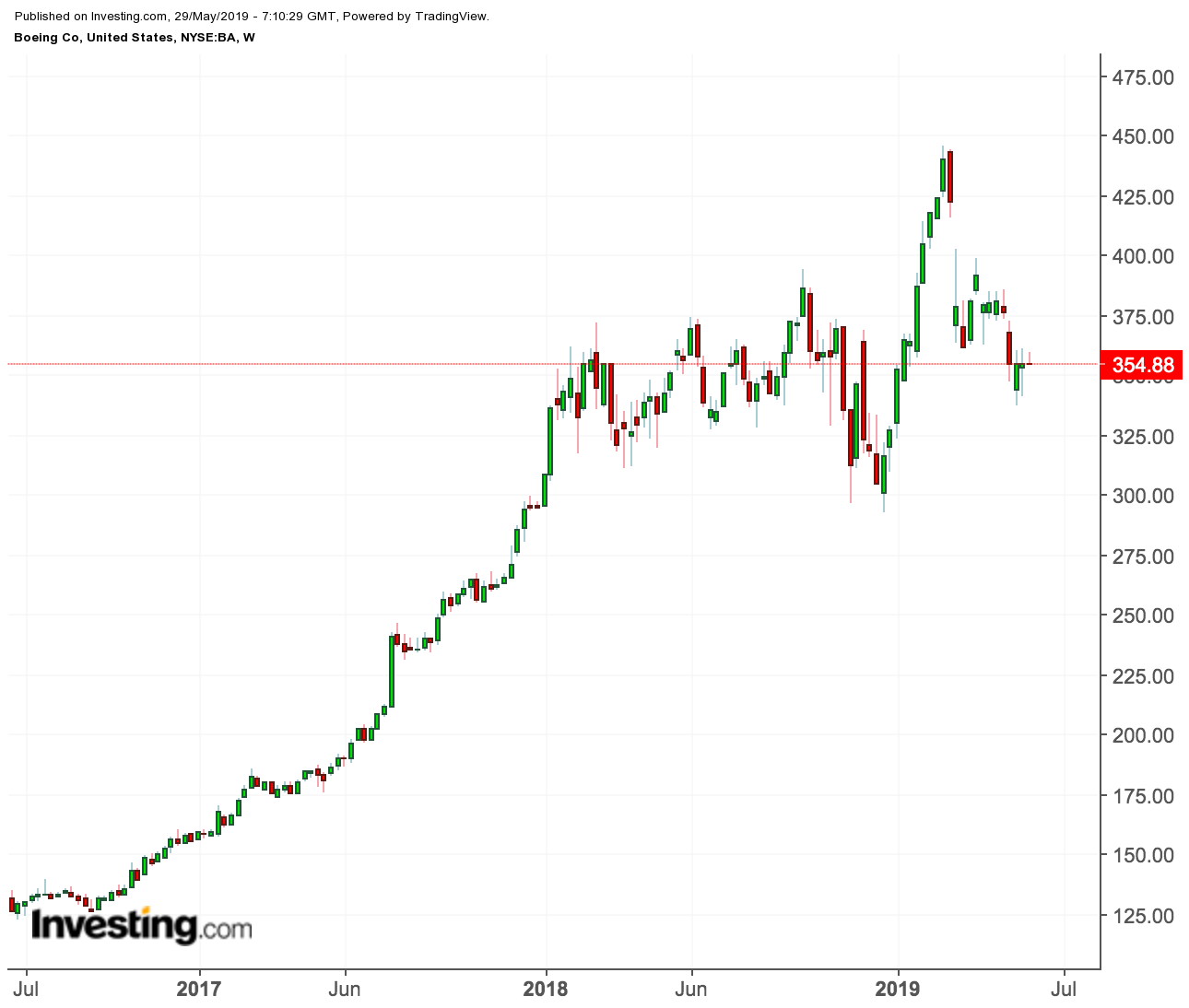The tug of war between the bulls and bears of Boeing Co. (NYSE:BA) persists. While the company continues to deal with the backlash from two fatal 737 MAX crashes within the span of five month, bullish investors are betting on a swift recovery of this beaten-down stock.
There are 18 buy ratings on the most valuable industrial stock, far exceeding the nine hold and two sell recommendations. The average price target for the next 12 months is $429, implying about 20% upside potential from the stock’s current price of $354.88. However, it's down 1.5% in the past year, and the slide appears to be accelerating: the shares have tumbled 6.8% in the last month.

But the big question for investors seeking financial gain from this situation is whether Boeing has already seen the worst of this crisis which forced the airplane maker to ground its best-selling model worldwide and drastically cut its production. There's no quick answer, though, because it all depends upon the conclusion of multiple inquiries in various jurisdictions, Boeing’s ability to quickly release the software fix, and the lifting of a global ban on the 737 MAX.
This outcome, in our view, is not going to materialize anytime soon. The latest news flow suggests it may take longer than many had expected.
Bloomberg reported yesterday that European regulators assessing changes to Boeing’s grounded 737 MAX will scrutinize the jet’s entire flight-control system before the plane can return to the skies. A report by The Wall Street Journal early this month said that Boeing limited the role of its own test pilots in the final stages of developing the 737 MAX flight-control system.
The big concern was that pilots “didn’t receive detailed briefings about how fast or steeply the automated system known as MCAS could push down a plane’s nose,” the Journal reported. And then there was a story in the New York Times that questioned the company’s culture, saying it often gave preference to production speed over quality.
Fear of Getting on Board 737 MAX
While the negative media coverage was very much expected when so many innocent lives were lost in the two 737 crashes, it also makes the task of regulators very difficult as they don’t want to be seen to be rushing the investigation and giving the company a clean slate too quickly.
Amid this negative press, some analysts have also started to raise the possibility that passengers may not feel comfortable boarding 737 MAX aircraft when the worldwide grounding is lifted.
Barclays Capital analyst David Strauss said in a recent note downgrading the stock that Wall Street was underestimating the fallout from the 737 MAX crashes in Indonesia and Ethiopia. He also cited a survey of fliers showing nearly half won’t fly MAX for year or more:
“There’s a risk that it could be worse this time than following past incidents, given social media and fliers’ ability to know the aircraft type in advance of booking.”
The company’s latest earnings report in April showed that strong sales at Boeing’s defense and services divisions and a production increase for the 787 Dreamliner were, to some extent, mitigating the impact of the MAX grounding. But that equation could change fast if regulators take more than six months to finish their work and allow the 737 MAX to fly again.
The 737 MAX is Boeing's largest contributor of product revenue and earnings before interest and taxes (EBIT), according to Goldman Sachs estimates, with the potential to make up 45% of Boeing’s EBIT over the next five years.
Bottom Line
There is no doubt in our minds that Boeing will ultimately pull out of this crisis. Airlines have no alternative but to pick one from the Boeing-Airbus (PA:AIR) plane-maker duopoly. But we also fear that BA earnings might take a greater hit before coming back to their normal trajectory. And despite these uncertainties, BA stock is still selling at a premium valuation when compared to the overall market, suggesting to us that there is a greater risk to the downside than upside in the near term. Staying on the sidelines is a better course of action than buying this stock now.
